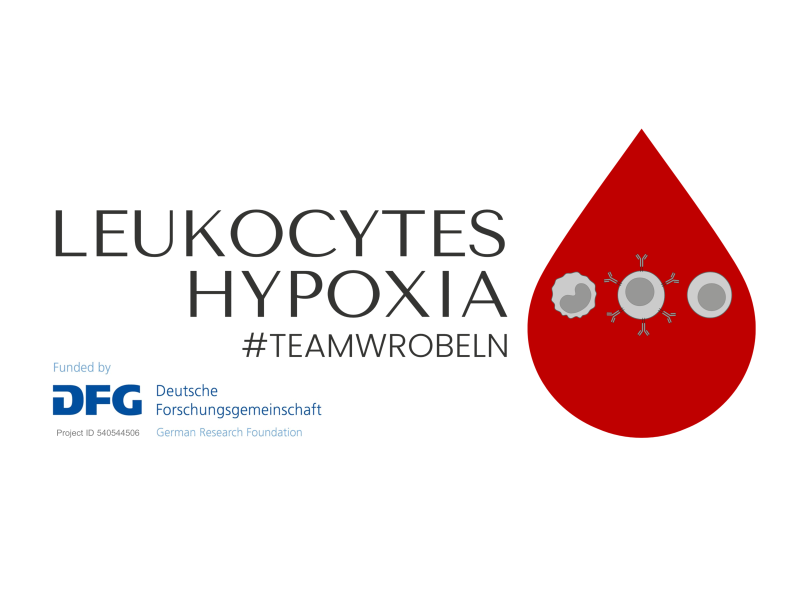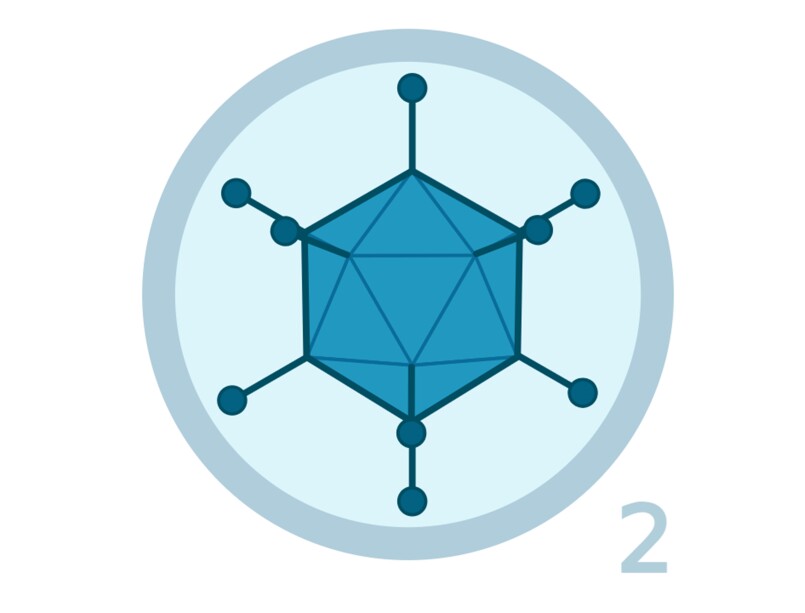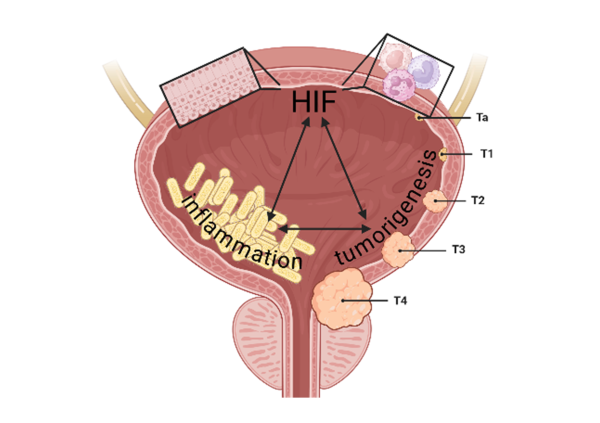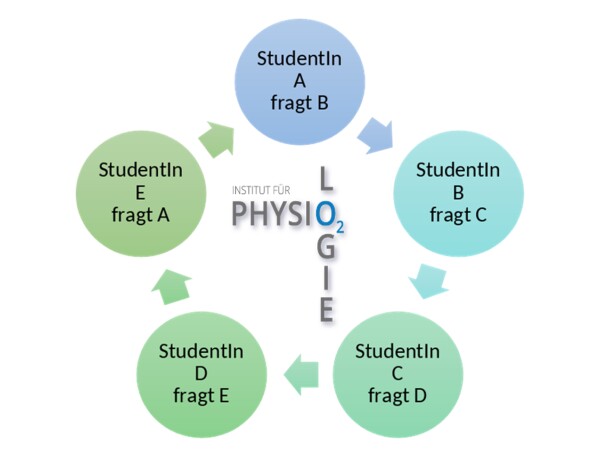Research Objective Group Professor Fandrey
Our team focuses on oxygen-dependent gene expression and the cellular oxygen sensor
Dr. rer. nat. Yoshiyuki Henning Team RPE and retinal metabolism

We are interested in physiological and pathophysiological processes in the retinal pigment epithelium (RPE) and the retina, two tightly interacting tissues in the eye. Our first research focus is on RPE and retinal metabolism and how signaling pathways associated with hypoxia-inducible factors (HIF) and the mammalian target of rapamycin (mTOR) are involved in retinal diseases, such as age-related macular degeneration. In a second research focus, we are investigating HIF-regulated pathways in ferroptosis and its implications for age-related macular degeneration.
Team members:
Dr. rer. nat. Anna Wrobeln Team Hypoxia and Leukocytes

We aim to understand the influence of tissue-dependent oxygen partial pressure on leukocytes. In this context, we investigate the influence of pharmacological treatments in different diseases (e.g. HHT) in close collaboration with the corresponding clinics of the University Hospital Essen. We mimic tissue or inflammatory conditions in ex vivo assays with leukocytes from patients and healthy volunteers. We correlate changes in the transcriptome, hypoxia-specific proteins and glucose metabolism with their functionality. Our analysis is based on Next Genome Sequencing, qPCR, Western blotting, fluorescence staining, metabolic flux analysis (Seahorse), and flow cytometry.
Team members:
Dr. rer. nat. Tristan Leu Team primary cilia signaling via hypoxia-inducible factors

Primary cilia are necessary for processes like proliferation, apoptosis, and differentiation. Disruption of this signal transmission leads to a multitude of deadly human diseases, including deformations of the central nervous system. Especially in situations without suitable oxygen supply, e.g. in case of an ischemic stroke, it is necessary to provide relevant signals for counter-regulations quickly. One of the most important factors in such critical situations are hypoxia-inducible factors (HIFs). We investigate the function of HIFs in signal transmission of primary cilia in order to understand the ciliary function in oxygen deficiency of cells and tissues.
Team members:
PD Dr. rer. nat. Sandra Winning Team Inflammatory Hypoxia

Hypoxia is a hallmark of inflammation (due to edema, vasoocclusion and infiltrating immune cells consuming large amounts of oxygen for the oxidative burst). We investigate the link between hypoxia-inducible factors (HIFs) and inflammatory processes. Therefore, we study the responses of immune cells and the cells of the inflammatory microenvironment e.g. in the onset of colitis or during the course of viral infections.
Team members:
Dr. rer. nat. Anna Malyshkina Team Hypoxia and Viral infections

Viral infections have significant impacts on public health, ecosystems, and economies, driving extensive scientific research. However, the role of hypoxia in viral infections is often overlooked. Hypoxia, characterized by reduced oxygen levels, has been shown to impair adenoviral replication, limiting the utility of adenoviruses in cancer therapy. We aim to explore the interplay between hypoxia and viral infections, with a focus on human adenovirus, to identify more effective adenoviral vector candidates. Our work seeks to advance the development of novel oncolytic vectors, contributing to the promising field of oncolytic virotherapy.
Team members:
PD Dr. rer. nat. Sandra Winning Team inflammation and bladder cancer

Hypoxia is linked with cancer progression and inflammation. In addition, chronic inflammation is often associated with a higher risk for cancerogenesis. We want to unravel the crosslinks between and interdependencies of these three objectives in a model of bladder cancer.
Team members:
Dr. rer. nat. Anna Wrobeln Team HIF-1α and p53 in colorectal cancer

Our study focuses on the role of hypoxia inducible factor-1α (HIF-1α) and its interaction with p53 (frequently mutated in colorectal diseases). Loss of HIF-1α in some cells seems to protect against the transition from ulcerative colitis to colorectal cancer, whereas the loss of p53 appears to promote the growth of cancer. We want to analyze which of the two processes is the dominant one and want to understand the molecular relation between HIF-1α (and the other isoforms) and p53.
Team members:
Dr. rer. nat. Katrin Prost-Fingerle Team Protein-protein interaction of hypoxia-inducible factors (HIFs)
HIFs form transcriptionally active complexes with co-activators. We use advanced microscopic techniques as FRET (Fluorescence Resonance Energy Transfer) and FLIM (Fluorescence Lifetime Microscopy at the IMCES) to investigate protein-protein interactions of HIF subunits and HIF inhibitors and to analyze oxygen sensing in living cells.
Team members:
PD Dr. rer. nat. Sandra Winning / Dr. rer. nat. Katrin Prost-Fingerle M1ündlich – S(t)imulation kompetenzorientierten Lernens

Viele Medizinstudierende fühlen sich nur unzureichend auf mündliche Prüfungen vorbereitet.
Um dieser Herausforderung zu begegnen, eine möglichst angstfreie Vorbereitung zu gewährleisten sowie die Studierenden beim gezielten Beantworten spezifischer Fachfragen zu unterstützen, haben wir ein Peer-Tutorium ins Leben gerufen. Durch das Verbalisieren und Präsentieren von Lerninhalten soll zum einen der Prüfungsdruck gemindert und gleichzeitig die Prüfungsrhetorik geschult sowie das strukturelle Wiedergeben von Inhalten geübt werden.
Die Auswirkungen dieser Peer-Tutorien auf den subjektiven und auch den objektiven Erkenntnisgewinn werden von uns wissenschaftlich evaluiert.

